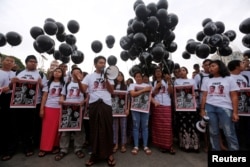Two Reuters journalists in Myanmar lost their appeal Friday against their conviction and seven-year jail sentences.
Wa Lone and Kyaw Soe Oo were arrested in December 2017 for violating Myanmar's Official Secrets Act.
The judge who upheld the conviction said the journalists' lawyers did not provide sufficient evidence to prove their innocence. "It was a suitable punishment," High Court Judge Aung Naing said of the sentence.
The men say they were arrested in a setup by police intended to inhibit reporting on a massacre of Rohingya, a minority Muslim group.
Reuters Editor-in-Chief Stephen Adler said, in a statement, that the two men "remain behind bars for one reason: those in power sought to silence the truth."
Adler said,"Reporting is not a crime, and until Myanmar rights this terrible wrong, the press in Myanmar is not free, and Myanmar's commitment to rule of law and democracy remains in doubt."
State Department deputy spokesperson Robert Palladino said the United States is "deeply disappointed" that the Yangon High Court upheld the journalists' conviction.
"A free and independent press should be protected in any democracy," Palladino said in a Friday statement. "Today’s ruling casts doubt not only on freedom of expression in Burma, but also raises questions about Burma’s commitment to the rule of law. We will continue to advocate at all levels for the just release of these brave journalists."
Jeremy Hunt, Britain's foreign secretary, said the leader of Myanmar should be taking a personal interest in the case and determining whether due process was adhered to.
Kristian Schmidt, the European Union ambassador to Myanmar said Friday's ruling was a "miscarriage of justice and it gives us great concern for the independence of the justice system of Myanmar."
The United Nations has likened Myanmar's brutal military crackdown on the Rohingya to ethnic cleansing.
Hundreds of thousands of Rohingya have fled their homes in Myanmar's Rakhine State to camps in neighboring Bangladesh.
Wa Lone and Kyaw Soe Oo were among a group of journalists named in December as Time Magazine's "Person of the Year."
The case has raised questions about Myanmar's march to democracy and commitment to press freedom.






